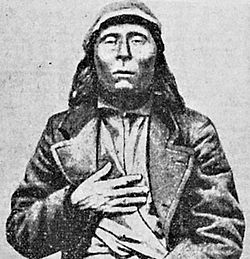Paulina (Paiute leader)
| Chief Paulina | |
|---|---|
| Pahninee | |

Chief Paulina, circa 1865
|
|
| Northern Paiute leader | |
| Personal details | |
| Born |
November 13, 1833 Unknown |
| Died | April 25, 1867 (aged 33) Jefferson County, Oregon |
| Cause of death | Shot by Howard Maupin or James Clark |
| Resting place | Unmarked location |
Chief Paulina or Pahninee was a Northern Paiute war leader noted for his successful guerrilla tactics. He is known to have been active from 1859 until his death in 1867.
During the late 1850s and 1860s, Paulina led a band of Northern Paiutes that violently resisted encroachment on their lands. The band refused to relocate to a Native American reservation and attacked settler communities traveling through or living on Paiute lands in central and eastern Oregon and the Klamath Basin.
Paulina became the most notorious war leader in those raids. He was known for the swiftness of his attacks and his ability to evade capture by both volunteer regiments and U.S. Army detachments under General George Crook. He led a small band (including his brother Wahveveh) that raided and stole livestock and horses, causing fear within nearby communities. The band also attacked Indians living on the Warm Springs Indian Reservation. There has been some speculation that Paulina's hatred for the Warm Springs Indians and Caucasian settlers occurred in April 1859 when Dr. Thomas Fitch led Native Americans from the Warm Springs Indian Reservation to attack a band of Paiutes in the valley of the John Day River. The party killed 10 Paiute warriors, capturing the women and children and the rest of the band. Among those captured were Paulina and Wahveveh, both of whom were later sent to Fort Dalles only to be imprisoned for a short time.
Captain John M. Drake led one of the first military campaigns into the area. Paulina defeated an army attack on his camp near Juniper Butte, and the conflicts increased. The Paiute threat was broken up into two bands led by Paulina, of the Walpapi band, and Weahwewa, of the Kidutokado band. In one particular incident, Paulina arranged peace talks with the Chief of the Wascos, Queapama. However, under that guise, Paulina had one of his braves murder Queapama. While predatory bands such as Paulina’s certainly profited from these attacks, they ultimately contributed to the climate of hostility that increased the level of violence and the death toll in the region. All the resident groups—settlers, native communities at Warm Springs and Umatilla, and the Northern Paiute—engaged in retaliatory actions that resulted in the deaths of dozens of people, including women and children.
...
Wikipedia
